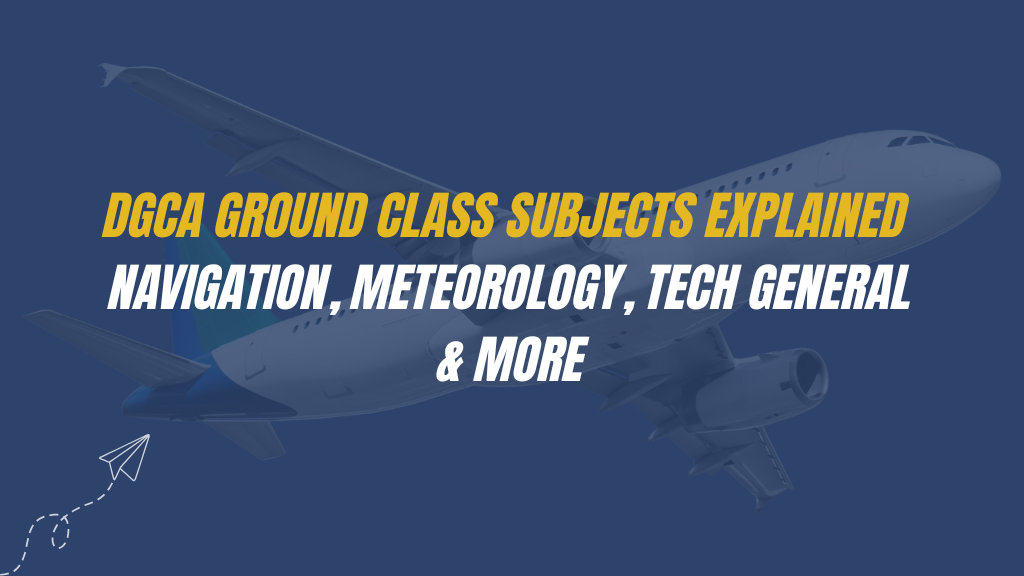
Aiming to become a commercial pilot in India? One of the essential steps in your aviation journey is understanding the DGCA Ground Class Subjects. Ground classes form the foundation of your pilot training, equipping you with the theoretical knowledge required to safely operate aircraft and handle real-world flying challenges. In this blog, Top Crew Aviation Blog will break down all the key DGCA subjects, including Navigation, Meteorology, Technical General, Air Regulations, and more, to help aspirants prepare effectively and confidently.
What Are DGCA Ground Class Subjects?
The DGCA Ground Class Subjects are a series of theoretical courses mandated by the Directorate General of Civil Aviation (DGCA), India, for pilot trainees. These subjects cover critical knowledge areas such as aviation rules, aircraft systems, weather patterns, navigation techniques, and human factors affecting flight safety. Completing these courses is mandatory before appearing for DGCA examinations and progressing to flight training.
Ground school training ensures that aspiring pilots are not only skilled in practical flying but also well-versed with the rules, regulations, and technical concepts that govern aviation operations in India and worldwide.
1. Air Regulations
One of the most crucial DGCA Ground Class Subjects is Air Regulations. This subject educates pilots on the legal framework governing civil aviation. Topics include:
- Civil aviation rules and acts in India
- DGCA guidelines and their implementation
- Aircraft registration and airworthiness
- Licensing requirements and pilot privileges
- Airspace classification and navigation rules
A solid understanding of Air Regulations ensures that pilots operate within the legal boundaries and maintain aviation safety standards.
2. Aviation Meteorology
Weather plays a significant role in flight safety. Meteorology, as part of the DGCA Ground Class Subjects, equips pilots with the knowledge to interpret and respond to changing weather conditions. Key areas include:
- Types of clouds and their impact on flight
- Wind patterns, jet streams, and turbulence
- Aviation weather reports (METARs and TAFs)
- Icing, thunderstorms, and visibility considerations
- Weather prediction and decision-making
Understanding meteorology helps pilots make informed decisions during pre-flight planning and in-flight, minimizing risks related to adverse weather.
Read Also – Eligibility Criteria for CPL Ground Classes In 2025
3. Air Navigation
Air Navigation is a critical subject that ensures pilots can determine their position, plan routes, and safely reach destinations. Navigation training under DGCA Ground Classes covers:
- Principles of dead reckoning and pilotage
- Use of navigational aids like VOR, NDB, and GPS
- Flight planning and route selection
- Time, speed, and distance calculations
- Map reading and airspace navigation
Mastering navigation ensures precision in flight operations and prepares pilots for complex air traffic environments.
4. Technical General (Aircraft Systems)
Understanding the aircraft is as important as flying it. Technical General is a fundamental DGCA Ground Class Subject that provides knowledge about aircraft systems, including:
- Aircraft engines and propulsion systems
- Electrical, hydraulic, and pneumatic systems
- Flight control systems and instruments
- Aircraft performance and limitations
- Emergency procedures and system malfunctions
A strong foundation in Technical General enables pilots to handle technical issues confidently and ensures safety during flights.
5. Airframes & Engines (Technical Specific)
This subject goes deeper into aircraft-specific systems. Aspiring pilots learn about:
- Aircraft structures and materials
- Engine types and performance characteristics
- Fuel systems, landing gear, and auxiliary power units
- Maintenance procedures and inspections
Knowledge in Airframes & Engines is critical for understanding aircraft behavior and responding to in-flight technical challenges.
6. Human Performance & Limitations
Even the most advanced aircraft require a pilot who understands human factors. This DGCA Ground Class Subject focuses on:
- Physiological and psychological aspects affecting pilots
- Effects of fatigue, stress, and hypoxia
- Crew resource management (CRM)
- Decision-making under pressure
- Communication and situational awareness
Training in human performance helps reduce pilot error and enhances flight safety.
7. Radio Telephony (RT) & Communication
Effective communication is essential for safe flight operations. This DGCA subject teaches pilots:
- Aviation communication protocols
- Radio telephony procedures and phraseology
- Distress and emergency communications
- Coordination with air traffic control (ATC)
- Handling communication equipment on board
Pilots trained in RT can maintain clear and concise communication, ensuring smooth and safe flight operations.
8. Flight Planning & Operational Procedures
Another important component of DGCA Ground Classes is Flight Planning and Operational Procedures. This subject covers:
- Pre-flight planning techniques
- Fuel calculation and weight & balance
- Aircraft performance charts
- Standard operating procedures (SOPs)
- Emergency response and contingency planning
Comprehensive knowledge of operational procedures ensures pilots are well-prepared for normal and emergency situations.
9. Safety, Security & Emergency Procedures
Safety is non-negotiable in aviation. Pilots are trained on:
- Safety management systems (SMS)
- Firefighting and evacuation procedures
- Survival skills and first aid
- Threat and error management
- Security protocols
This ensures pilots can respond effectively during emergencies, protecting passengers, crew, and aircraft.
Tips to Excel in DGCA Ground Class Subjects
- Regular Study Routine: Dedicate daily hours for theory preparation.
- Reference Standard Books: Use DGCA-recommended textbooks and manuals.
- Practice Question Papers: Solve previous DGCA exam papers to get familiar with patterns.
- Group Discussions: Discuss complex topics with peers to strengthen understanding.
- Use Visual Aids: Charts, diagrams, and videos help retain technical knowledge.
Conclusion
The DGCA Ground Class Subjects are an integral part of becoming a licensed pilot in India. From Air Regulations and Meteorology to Technical General and Navigation, each subject equips you with the knowledge to operate aircraft safely and professionally. Whether your goal is to fly for Indigo, Air India, or international airlines, mastering these subjects lays the foundation for a successful aviation career.
By following a structured study plan and leveraging resources like Top Crew Aviation Blog, aspirants can confidently navigate DGCA examinations and soar toward their dreams of becoming skilled commercial pilots.
Frequently Asked Questions
What are the main DGCA Ground Class Subjects for pilot training?
The main DGCA Ground Class Subjects include Air Regulations, Meteorology, Air Navigation, Technical General, Airframes & Engines, Human Performance & Limitations, Radio Telephony, Flight Planning, and Safety & Emergency Procedures. These subjects provide the theoretical foundation required for pilot training and DGCA examinations.
Why is Meteorology important in DGCA Ground Classes?
Meteorology teaches pilots to understand weather patterns, clouds, wind, turbulence, and aviation weather reports. This knowledge helps pilots make safe flight decisions, avoid hazardous weather, and plan efficient flight routes.
How does Air Navigation training help aspiring pilots?
Air Navigation training equips pilots with skills to determine aircraft position, plan routes, and use navigational aids like GPS, VOR, and NDB. It ensures precise and safe navigation during flights.
What topics are covered under Technical General in DGCA courses?
Technical General covers aircraft systems such as engines, electrical and hydraulic systems, flight controls, instruments, aircraft performance, and emergency procedures. It prepares pilots to handle technical issues during flight.
Can completing DGCA Ground Classes improve chances of clearing pilot exams?
Yes, completing DGCA Ground Classes provides in-depth theoretical knowledge, helping aspirants understand exam patterns, answer questions accurately, and build a strong foundation for both exams and practical flight training.



